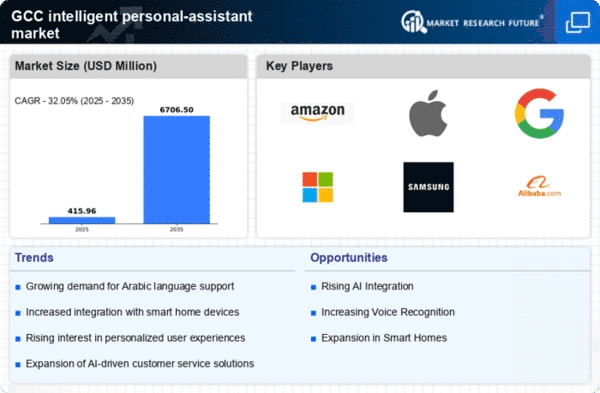Rising Demand for Automation
The intelligent personal-assistant market is experiencing a notable surge in demand for automation across various sectors in the GCC. As businesses and consumers increasingly seek efficiency, the integration of intelligent personal assistants into daily operations appears to be a key driver. According to recent data, the automation market in the GCC is projected to grow at a CAGR of 15% from 2025 to 2030. This growth is likely to enhance the adoption of intelligent personal assistants, as they streamline tasks and improve productivity. Furthermore, the increasing reliance on technology in both personal and professional settings suggests that the intelligent personal-assistant market will continue to expand, catering to the needs of a tech-savvy population eager for innovative solutions.
Increased Smartphone Penetration
The intelligent personal-assistant market is benefiting from the increased penetration of smartphones in the GCC region. As smartphone usage continues to rise, consumers are becoming more accustomed to utilizing intelligent personal assistants for various tasks, from setting reminders to controlling smart devices. Current estimates suggest that smartphone penetration in the GCC is nearing 90%, which indicates a vast potential user base for intelligent personal assistants. This trend is likely to encourage developers to enhance their offerings, ensuring that these assistants are more accessible and user-friendly. Consequently, the intelligent personal-assistant market is poised for growth as more individuals integrate these technologies into their daily lives.
Expansion of E-commerce Platforms
The intelligent personal-assistant market is significantly influenced by the rapid expansion of e-commerce platforms in the GCC. With online shopping becoming a preferred choice for consumers, the demand for personalized shopping experiences is on the rise. Intelligent personal assistants are increasingly being integrated into e-commerce applications to provide tailored recommendations and facilitate seamless transactions. Recent statistics indicate that e-commerce sales in the GCC are expected to reach $28 billion by 2026, which could further drive the adoption of intelligent personal assistants. This trend suggests that businesses are recognizing the potential of these assistants to enhance customer engagement and satisfaction, thereby propelling the growth of the intelligent personal-assistant market.
Growing Interest in AI Technologies
The intelligent personal-assistant market is witnessing a growing interest in artificial intelligence (AI) technologies within the GCC. As organizations and consumers alike become more aware of the capabilities of AI, the demand for intelligent personal assistants that leverage these technologies is likely to increase. The GCC governments are investing heavily in AI initiatives, with plans to allocate over $20 billion towards AI development by 2030. This investment is expected to foster innovation and enhance the functionality of intelligent personal assistants, making them more appealing to users. As a result, the intelligent personal-assistant market may experience substantial growth driven by advancements in AI and machine learning.
Shift Towards Remote Work Solutions
The intelligent personal-assistant market is being propelled by a shift towards remote work solutions in the GCC. As more companies adopt flexible work arrangements, the need for tools that facilitate communication and organization has become paramount. Intelligent personal assistants are increasingly being utilized to manage schedules, coordinate meetings, and streamline workflows for remote teams. Recent surveys indicate that approximately 60% of businesses in the GCC are considering permanent remote work options, which could lead to a sustained demand for intelligent personal assistants. This trend suggests that the intelligent personal-assistant market will continue to thrive as organizations seek to enhance productivity and collaboration in a remote work environment.
















